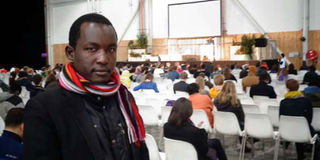Rising temperatures are hurting us, Kenyan student tells leaders

Ekai Nabenyo, 23, from Turkana County representing his community in the ongoing climate change discussion in Paris, France. He hopes world leaders will strike a deal that will see emission of greenhouse gases reduced. PHOTO | NATION MEDIA GROUP
What you need to know:
- Here, the leaders are expected to agree to pact that will reduce the emissions that have led to a rise in temperatures in the world.
- The UN climate science panel says the shifting rainfall patterns will heighten the strain on water resources, which is already a major challenge in Turkana.
- Rainfall patterns have become unpredictable, according to report and average temperatures in the region have increased by two to three degrees Celsius.
As the conference on climate change started in France Monday, a young Kenyan hopes world leaders will strike a deal that will see emission of greenhouse gases reduced.
Twenty-three-year old Ekai Nabenyo from the Turkana County, says global warming has affected his community so much and he hopes the meeting, also known as COP21 in Paris will solve the problem.
So important is the matter to him that Mr Nabenyo opted to skip his graduation at the University of Nairobi on Friday to be in France, nearly 6, 000km away, to represent his community in the climate change discussions.
Here, the leaders are expected to agree to pact that will reduce the emissions that have led to a rise in temperatures in the world.
The ever increasing temperatures have had adverse effects on economy, health and the environment of countries such as Kenya.
“I am here to remind world leaders that my pastoralist community is affected by climate changes, including droughts and extreme heat. I am here because we are struggling to cope with the impacts of climate change,” Mr Nabonye told the Nation.
The UN climate science panel says the shifting rainfall patterns will heighten the strain on water resources, which is already a major challenge in Turkana.
“I tended my fathers cattle in once green vegetation and water was available after a few meters. Now, there is no grass or water. My community migrates to areas where they hear these resources are available. Of course they meet local inhabitants and conflicts erupt,” says Mr Nabenyo who will be graduating with a law degree.
“I am worried if world leaders fail to act to limit global warming, then my community and our livelihood may cease to exist. We are banking on the Paris deal to reduce our suffering.”
FOOD SCARCITY
The Kenyan government, in its national climate change plans, says floods and drought will continue to slow down development that consume up to three per cent of the GDP.
A recent report by Human Rights Watch titled: There is No Time Left: Climate Change, Environmental Threats and Human Rights in Turkana County, Kenya says climate change is among major factors people in Turkana cannot access food and water.
As a result many people are dependent on food aid from the UN’s World Food Programme.
The change in climate has heightened the level of poverty for the people of Turkana.
According to the report, rainfall patterns have become unpredictable and average temperatures in the region have also increased by two to three degrees Celsius.
But that is not Mr Nabenyo’s only worry as discovery of oil in his community brings with it mixed emotions.
“Oil promises an alternative route out of poverty but I am worried because environmental degradation as this involves burning of fossil fuels. My community needs to know about their rights to a clean environment. We are afraid this resource may hurts us in the end.”
He wants the county government to impose a levy on oil companies exploring the resource then use proceeds to help locals to adapt to the impacts of climate change as droughts.
African countries will need Sh35-50 trillion a year by 2050 to effectively tackle droughts and flooding according to the United Nations.





